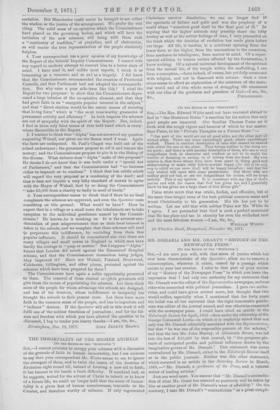[To THE EDITOR OE TIM "SPECTATOR."] SIR,—The Rev. Edward White
need not have ventured abroad to find in "the illustrious Rothe " a sanction for his notion that only good people are immortal. Our familiar Thomas Paine set it forth with the rough vigour and humour of which he was master. Says Paine, in his "Private Thoughts on a Future State :"— " One part of the world are not all good alike, nor the other part all wicked alike. There are some exceedingly good, others exceedingly wicked. There is another description of men who cannot be ranked with either the one or the other. They belong neither to the sheep nor the goats ; and there is still another description of them, who are so very insignificant both in character and conduct as not to be worth the trouble of damning or saving, or of raising from the dead. My own opinion is, that those whose lives have boon spent in doing good and endeavouring to make their follow-mortals happy Ow this is the only way in ivhich we can serve God) will be happy hereafter ; and that the very wicked will moot with some punishment. But those who are neither good nor bad, or are too insignificant for notioo, will be dropt entirely. This is my opinion. It is consistent with my idea of God's justice and with the reason that God has given me, and I gratefully know he has given me a large share of that divine gift."
Paine wrote much that was crude, foolish, and offensive, but at the same time taught some of the best political common-sense and truest Christianity in his generation. His life has yet to be written. Let me add that with neither Paine nor Mr. White do I agree. I am persuaded that God is such a perfect economist that He has place and use in eternity for even the wickedest men and the most frivolous women.—I am, Sir, &c., 'WILLIAM WHITE.
30 Thurlow Road, .Flavstead, November 28, 1871.


































 Previous page
Previous page